"The Bone Fire," Reviewed by Megan Jackson
- May 12, 2021
- 3 min read

Fairy tale fans will recognize many aspects of György Dragomán’s new novel The Bone Fire: a young, newly orphaned protagonist, a witch who lives in the woods, and, of course, magic. The Hungarian novelist and Brody Prize winner blends the fantastical with the political in his third novel, which was translated into English by Ottilie Mulzet. The author’s transnational perspective lends beautiful cultural insights and elements to his novel. Though the Eastern European country is not explicitly named, its recent overthrow of Communism is often discussed, and Dragomán’s own birth in Transylvania and youth in Hungry helped inform the creation of his protagonist, Emma’s, world.
Some of her more fantastical experiences are easily dismissed, both by Emma and the reader, as the work of her overactive imagination, but others—love spells, ghost sightings, divination through seashells and coffee grounds—are corroborated by her unusual grandmother, leaving us to wonder how much of the account is reliable within the rules of Emma’s universe.
While her magic and tragic circumstances may not be particularly relatable, thirteen-year-old Emma’s experiences with her peers (earning respect from mean girls, finding friends as a new student, and puzzling encounters with boys she might like and boys who might like her) are intricately linked with the universally confounding teenage experience. The puzzling and macabre absurdism of her perspective touches something close to the heart of this time of life. Emma is uncertain of herself and her place in a new adult world, and allusions to a backstory that is never fully explained leave the reader struggling to keep up along with their protagonist. Was her parents’ death an accident, or a result of their political affiliations? Was her grandfather truly an informer for the Communist regime, as many of her classmates claim? Where did the bodies of the town’s slaughtered protestors go? Is her new guardian, who her mother never once mentioned, really her biological grandmother? More important than the answers to these questions are the emotions their presence evokes—frustration, embarrassment, feeling ostracized—for the readers along with Emma herself.
Personally, I found the novel a bit thin on plot. Different aspects of Emma’s new life with her grandmother were repeatedly explored, and the story did continue with consistency, but it felt more that I was observing episodes in her existence rather than reading a novel with a driving question or desire for the protagonist; as she progressed through her grief for her parents, Emma developed new relationships and felt fleeting desires for different things (chestnuts, a relationship with a classmate, membership on the long-distance running team), but there was no one arc of the plot to guide her. Perhaps Dragoman intended Bone Fire as more of a character-fueled arc. Emma did come out of her shell considerably after the first several chapters, as she settled into life with her grandmother and her relationships with people at school, but after that initial development she remains largely the same for the rest of the novel. Instead, readers get an intimate snapshot of a person at thirteen: compelling, fierce, inquisitive, and, slowly, healing. Fortunately, I found her a very sympathetic character and I’m always a sucker for a good spell, rendering this book an enjoyable read.
If you miss the Brothers Grimm and enjoy explorations of character, I would strongly recommend The Bone Fire.
The Bone Fire
By György Dragomán, translated from the Hungarian by Ottilie Mulzet
Mariner Books
Megan Jackson is a junior at Villanova University majoring in Political Science with a concentration in Writing and Rhetoric and a minor in Spanish. She aspires to use her writing and Spanish skills to advocate for immigration policy reform after graduation.




Comments